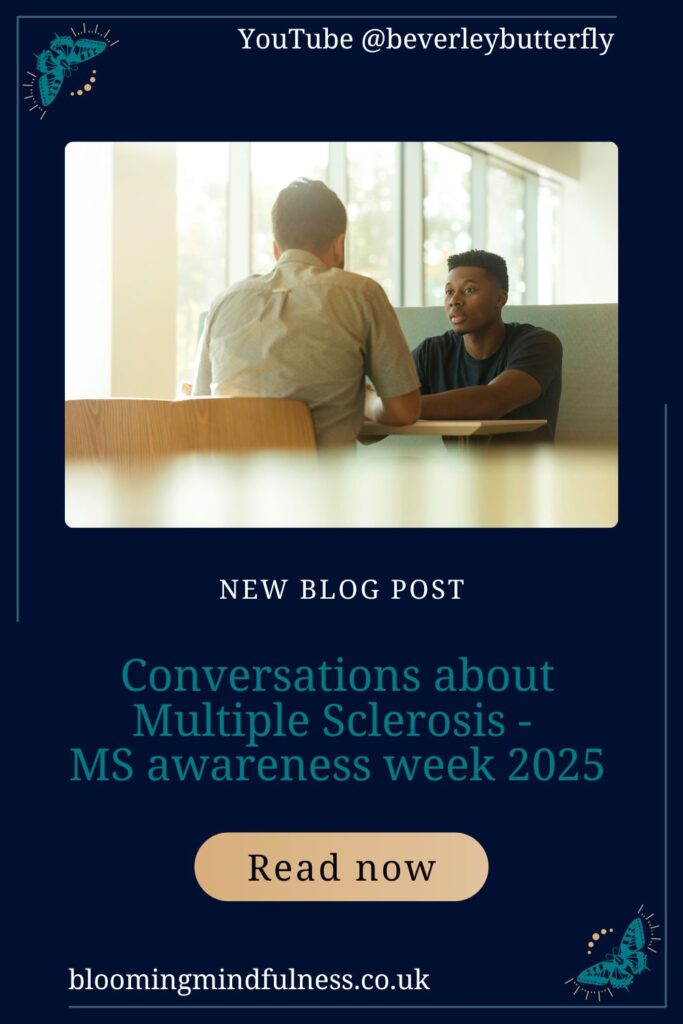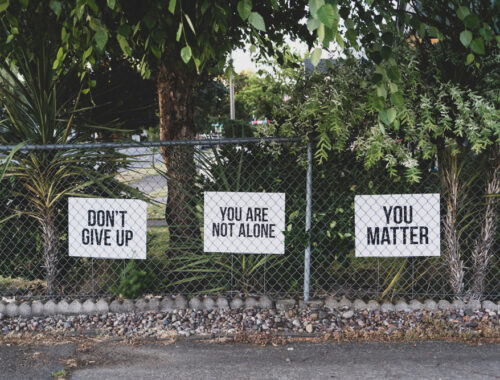
Conversations about Multiple Sclerosis – MS awareness week 2025
Conversations about Multiple Sclerosis can be awkward, difficult and emotional and are often things we avoid. It is a well-known illness, and something that is recognised by society as being legitimately disabling. Yet, asking questions, telling friends and family or letting work know can be so hard, so let’s get into it.

Why conversations can be hard
The first diagnosis I ever got was multiple sclerosis, I was treated as if I had it for about six years before my neurologist told me I didn’t have it. Both very difficult conversations to have but gaining and then losing that diagnosis taught me a lot about disability.
When I was given the diagnosis, telling my family and friends was so emotional, I remember how much support and understanding I was given. It was like people really understood how difficult my illness was and how I needed help and support.
However, the moment the diagnosis was taken away, people changed towards me, and I have found that over and over again. It really was hard to say I have no diagnosis now and people found that so hard to understand because I have the same symptoms as I did before.
The hardest conversations about multiple sclerosis I had was when dating, especially when I met my now husband online and had to say I was disabled. I was so scared this amazing guy would ghost me like a few other people I had tried to connect with had.
As it turned out, he had epilepsy, so he was feeling the same, we supported one another, and it went well. But so often people don’t want to date someone with a disability, and something as accepted as MS can immediately be understood and that can come with assumptions.
My mother has multiple sclerosis now, and I have noticed that people understand her disability easier than my own. It is almost as if they see her as legitimately sick and struggling and see me as more complicated.
But, in reality, our symptoms can be quite similar, and mine are more unstable than hers which can be so hard. However, the good thing about us both being disabled, is that we can talk more openly about our illnesses or our experiences than most people can.
I lived with my parents when I first became sick, and both my parents struggled with it and not having that society idea that it is just laziness. To be honest, my mom was a wonderful carer, but I often felt as if my ways of coping with the diagnosis was hard for them to understand.
Since we both have similar symptoms, we can support one another, and I just wish everyone had that chance. I have seen both sides, and I hope that I can share so you can have better and easier conversations about multiple sclerosis.
This, MS awareness week, I really hope we can all start talking more about how this illness affects our lives without preconcieved ideas that are not reality. I know this can be hard with the governments plans here in the UK, but I encourage you to be open and to remember we are worthy of empathy and kindness.
Conversations about Multiple Sclerosis – MS awareness week 2025 Share on XHaving more productive disability chats
- Be open – This can be hard, especially if you know the persons views, but being open allows the other person to know they can ask questions. It gives you a chance to keep the conversation flowing and to talk it through
- Know your worth – Now, this one can also be difficult because society constantly pushes the narrative that disabled people are faking or are lazy. But we know that is not true, many of us work just as hard just to keep on top of our mental health and to live our best lives. So, know your worth that way no matter how the conversation goes, you can keep your head high.
- Be prepared – If you need to explain something or ‘prove’ something to a family member or work, even a doctor, having research and articles with you helps. Sometimes, it can give you a break while they read to have a breath but also gives them more focused information so they can ask more informed questions.
- Don’t overthink it – It can be so easy to let our negative and anxious thoughts to overwhelm us. But give people a chance, they might surprise you! Being mindful of our thoughts and not letting them spiral will help you so much with those first two points too.
- You aren’t alone – Sometimes, when you know there is a difficult conversation coming, it can feel like it’s you against the world. But if you check #MSConversations on social media you will see that isn’t the case. People all over the world are affected by MS and their experiences can inform and help you.
This MS Awareness Week, it is so important to remember conversations about multiple sclerosis raise understanding about this complex illness. We are all affected differently by it, but if it touches your life, like it has mine twice now, you can raise so much awareness, empathy and knowledge through talking about it.
Don’t forget you can donate to MS Trust (not affiliated)
Thank you xx
If you enjoy what I do, please support me on Ko-fi as a one-off tip or on Patreon for just £2 a month! that can help me keep my YouTube & blog going xx





2 Comments
Kaz
Thank you for sharing your experience and the advice. Unfortunately misdiagnosis isn’t handled well by society. Which isn’t fair on the misdiagnosed person as they can be left wondering “what now” and that is the time when support is needed.
admin
Exactly honey people forget that when the diagnosis is changed the person’s symptoms do not change xx